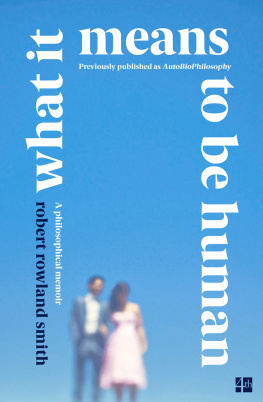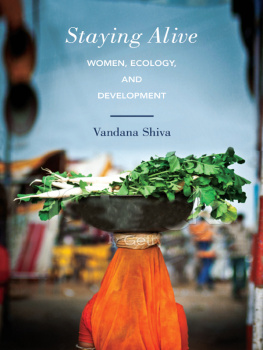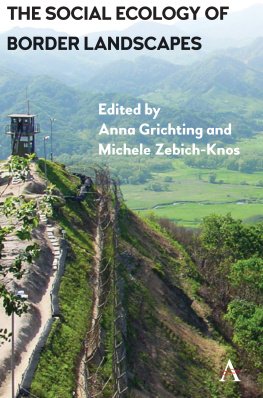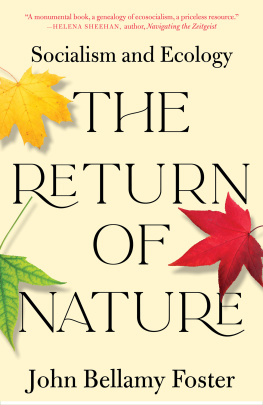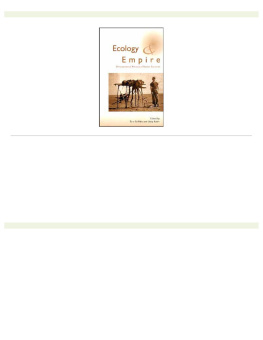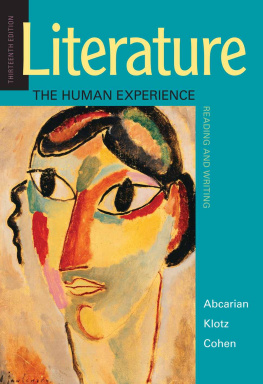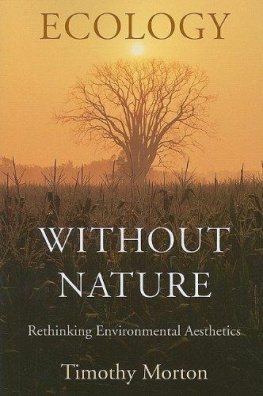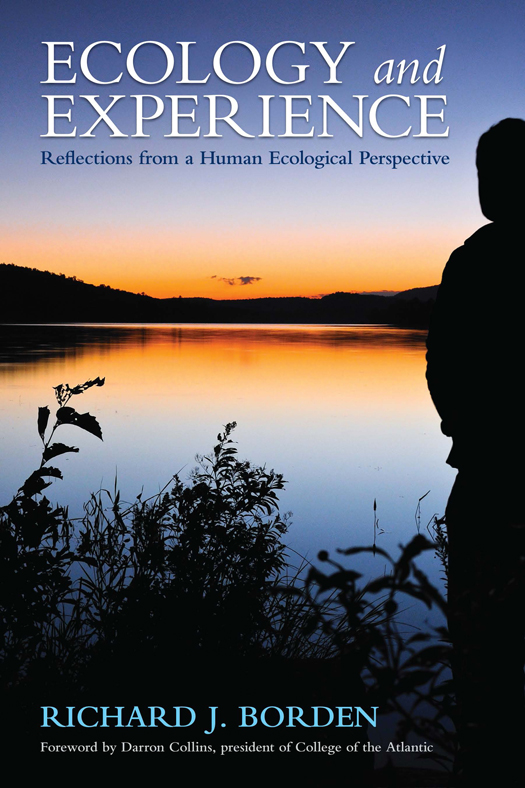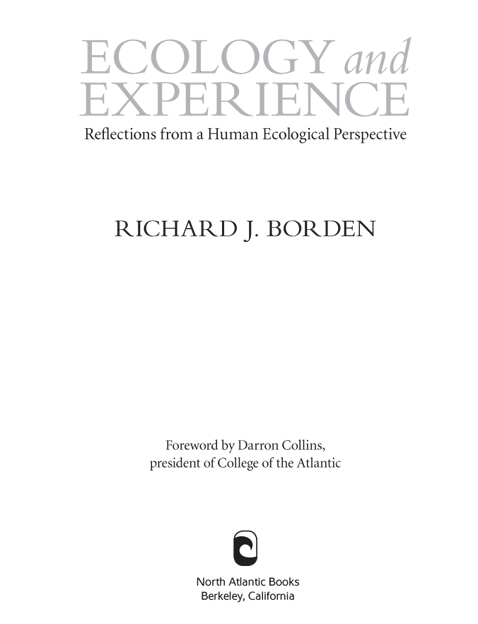Praise for Ecology and Experience
Richard Borden played an important role in the Ecological Society of America by leading the establishment of a human ecology section that focuses on the relationship between humans and their environment. His book continues his life-long commitment to expand our understanding and appreciation of this relationship.
KATHERINE MCCARTER , executive director of the Ecological Society of America (ESA)
If we want to learn how to think of life on a limited planet this is the book to read and absorb. Bordens wide range of experience and thoughts about the beauty of the blend of humans and the natural world will help us develop our own thinkingand maybe make us all into human ecologists. As Borden says: We are surrounded by the deep experience of life everywhere we go. If we can discover ways to be in touch with it, and allow it to touch us, this world will be a better place.
EVA EKEHORN , trustee, Commonwealth Human Ecology Council (CHEC), UK
Borden takes us on an amazing journey across time, space, and even mind, which makes us realize the existence of a tacit but strong keynote of the earthecology.
CHIHO WATANABE , professor and head, Department of Human Ecology, University of Tokyo
If you are at all interested in human ecology, the intersection of mind, nature, and higher education, you must read this indispensable, accessible, wonderful book. Borden respects and understands the rigor of disciplinary research, but reaches beyond its findings and questions to ones that lurk beyond the stream of the analytic mind. In this intellectual tour-de-force, an ultimate magnum opus, Borden offers ways to think and feel the world and ourselves whole, anew.
GENE MYERS , professor, Huxley College of the Environment, Western Washington University, author ofChildren and Animals, and coauthor ofConservation Psychology
Ecology and Experience is a compelling, inviting, and wise book. Richard Borden seamlessly blends intellectual biography and memoir with the dynamic challenge of our timehow to lead an ecologically sound life in a world of daunting change. The book is a conceptual masterpiece, covering an extraordinary range of ideas and concepts, all ultimately connected to human ecology and educational leadership. Whether Borden describes his childhood experiences, his intellectual maturation and development, his pioneering work as an academic dean, or his tireless efforts on behalf of human ecology, his stories and explanations are riveting, insightful, and rewarding. By uncovering the connecting threads of his own life, he helps us understand what matters most to many of usliving a rich and meaningful intellectual life.
MITCHELL THOMASHOW , author ofEcological IdentityandBringing the Biosphere Home
Professor Bordens book is human ecology. I dont mean its about human ecologyit is human ecology. It is an essential read
DAVID HALES , president, Second Nature
In Ecology and Experience Richard Borden addresses two fundamental and interlinked questions: What makes life possible? and What makes life worth living? The result is a unique inquiry, revealing both the development of Bordens quest to understand these questions and inviting the reader to reflect on his own learning experience and future pathways. Such challenges are necessary for us all if we are to collectively create humane, worthwhile, and sustainable futures within which we can flourish.
ROBERT DYBALL , convener, Human Ecology program, Fenner School of the Environment, Australian National University; president, Society for Human Ecology; and coauthor ofUnderstanding Human Ecology
This absorbing book is a multi-faceted gem that reveals a different aspect of life and humanity with the turning of every page. Fascinating, innovative, insightful, and inspiring, this book shows how important it is to think laterally about the ways we look at the world, the ways we convey our understanding of the world to others, and the way we teach and learn about ourselves, society, our relationships with others, with other living things, and with the landscapes and oceans of this blue planet.
IAN DOUGLAS , emeritus professor, School of Environment and Development, University of Manchester, UK; president, International Council for Ecopolis Development; and author ofCities: An Environmental History
Copyright 2014 by Richard J. Borden. All rights reserved. No portion of this book, except for brief review, may be reproduced, stored in a retrieval system, or transmitted in any form or by any meanselectronic, mechanical, photocopying, recording, or otherwisewithout the written permission of the publisher. For information contact North Atlantic Books.
Desire by George Bilgere reprinted by permission of the author.
| Published by |
| North Atlantic Books | Cover photo Zack C/Shutterstock.com |
| P.O. Box 12327 | Cover design by Suzanne Albertson |
| Berkeley, California 94712 |
Ecology and Experience: Reflections from a Human Ecological Perspective is sponsored by the Society for the Study of Native Arts and Sciences, a nonprofit educational corporation whose goals are to develop an educational and cross-cultural perspective linking various scientific, social, and artistic fields; to nurture a holistic view of arts, sciences, humanities, and healing; and to publish and distribute literature on the relationship of mind, body, and nature.
North Atlantic Books publications are available through most bookstores. For further information, visit our website at www.northatlanticbooks.com or call 800-733-3000.
The Library of Congress has cataloged the printed edition as follows:
Borden, Richard J.
Ecology and experience : reflections from a human ecological perspective
/ Richard J. Borden.
pages cm
ISBN 978-1-58394-772-2ISBN 978-1-58394-785-2
1. Human ecologyPhilosophy. I. Title.
GF21.B637 2014
304.2dc23
2013023677
v3.1
To Amy and Georgefor life and love
Andrew and Patriciafor love in life
Joe and Billfor the love of life
Acknowledgments
It is impossible to give a full account of everyone who has contributed to this book. First and foremost are the people named on the dedication page: My mother and fatherAmy Estelle (Moore) and George Warren Borden, my wife and sonPatricia and Andrew, and my former colleagues Joe Rychlak and Bill Drury. Insofar as I had an audience in mind while writing, they were front and center in my thoughts. The list from there includes my long-standing friends at College of the Atlantic (COA), who invited me to join them and became my closest intellectual companions: Ed Kaelber, COAs founding president and dream-weaving tender of the vision ever since; Bill Carpenter, who took me under his wing as a new faculty member and remains an invaluable source of good ideas, as were Dick Davis and Dan Kane, who have passed away. John Visvader and John Anderson joined the faculty later. Both have been treasured colleagues and companions, as well as helpful advisers on philosophical and ecological portions of this project. Former COA presidents Lou Rabineau (deceased) and Steve Katona, with whom I worked closely for years, were fountains of thoughtful mentoring and shared vision. Much could be added here about all of them. But these individuals and their influence are interlaced throughout the forthcoming pages.



